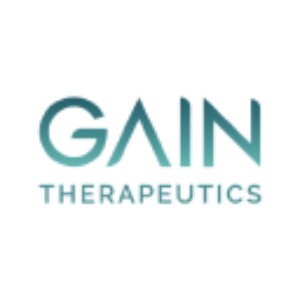Gain Therapeutics Announces Positive Results from the Single Ascending Dose (SAD) Part of the Phase 1 Clinical Trial of GT-02287, a Novel GCase-Targeting Small Molecule Therapy for GBA1 Parkinson’s Disease
BETHESDA, Md., April 24, 2024 (GLOBE NEWSWIRE) -- Gain Therapeutics, Inc. (Nasdaq: GANX) (“Gain”, or the “Company”), a clinical-stage biotechnology company leading the discovery and development of the next generation of allosteric small molecule therapies, announces positive results from the single ascending dose (SAD) part of its Phase 1 study. GT-02287 was generally well tolerated up to and including the highest planned dose level, and there were no serious adverse events. The good safety and tolerability profile and the appropriate range of plasma exposure levels achieved after oral administration further bolster GT-02287’s best and first-in-class potential.
The Phase 1 clinical trial is a single center, randomized, double-blind, placebo-controlled, single- and multiple ascending dose (SAD/MAD) study to evaluate the safety and tolerability of GT-02287 administered orally once daily in healthy adults. The secondary objective is to evaluate the pharmacokinetics of SAD and MAD dose levels to identify a maximum tolerated dose (MTD) and identify recommended doses for further clinical development in the setting of GBA1 Parkinson’s disease. The SAD part of the Phase 1 clinical trial enrolled 40 healthy participants across five separate cohorts – all of which were completed at the planned dose levels with no premature discontinuations or safety signals. The MAD part of the Phase 1 trials was initiated in February in parallel to the last SAD cohorts after approval from the Bellberry Human Research Ethics Committee (HREC) in Australia – a decision based on a review of the safety and tolerability profile observed in the SAD cohorts.
“We are encouraged by the promising data observed to date with GT-02287,” commented Gain CEO Matthias Alder. “The SAD data support further development of GT-02287 and we remain on track with our previous guidance to complete the multiple ascending dose (MAD) part of this Phase 1 clinical trial in Q2”.
“Current therapies only treat symptoms whereas GT-02287 has the potential to slow or stop disease progression in PD by treating the underlying cause of the disease. We expect to initiate a first-in-patient cohort in the Phase 1 clinical trial in the second half of 2024 that can provide proof of mechanism in patients with PD based on relevant biomarkers and potentially other exploratory measures,” added Gain Chief Medical Officer Jonas Hannestad.
GT-02287 has been shown to restore the function of the lysosomal enzyme glucocerebrosidase (GCase), which becomes misfolded and dysfunctional due to a GBA1 gene mutation, the most common genetic risk factor for the development of Parkinson’s disease. Compelling preclinical data presented at WORLDSymposium™ earlier in February 2024 demonstrated that treatment with GT-02287 restored motor function and substantially reduced plasma levels of the emerging neurodegeneration biomarker NfL. Based on these data, GT-02287 may have the potential to slow the progression of Parkinson’s disease.
About GT-02287
Gain Therapeutics’ lead drug candidate, GT-02287, is in clinical development for the treatment of GBA1 Parkinson’s disease (GBA1-PD). The orally administered, brain-penetrant small molecule is an allosteric protein modulator that restores the function of the lysosomal protein enzyme glucocerebrosidase (GCase) which becomes misfolded and impaired due to a GBA1 gene mutation, the most common genetic abnormality associated with PD. In preclinical models of PD, GT-02287 restored GCase enzymatic function, reduced aggregated α-synuclein, neuroinflammation and neuronal death, increased dopamine levels and improved motor function. Additionally, GT-02287 significantly reduced plasma neurofilament light chain (NfL) levels, an emerging biomarker for neurodegeneration.
Gain’s lead program in Parkinson’s disease has been awarded funding support from The Michael J. Fox Foundation for Parkinson’s Research (MJFF) and The Silverstein Foundation for Parkinson’s with GBA, as well as from the Eurostars-2 joint program with co-funding from the European Union Horizon 2020 research and Innosuisse – Swiss Innovation Agency.
About Gain Therapeutics, Inc.
Gain Therapeutics, Inc. is a clinical-stage biotechnology company leading the discovery and development of next generation allosteric therapies. Gain’s lead drug candidate GT-02287 for the treatment of GBA1 Parkinson’s disease, is currently being evaluated in a Phase 1 clinical trial.
Leveraging AI-supported structural biology, proprietary algorithms and supercomputer-powered physics-based models, the company’s Magellan™ drug discovery platform can identify novel allosteric binding sites on disease-implicated proteins, pinpointing pockets that cannot be found or drugged with current technologies. Magellan™ is the next generation of Gain’s original SEE-Tx® (Site-Directed Enzyme Enhancement Therapy) platform, which was enhanced and expanded with new AI and machine-learning tools and virtual screening capabilities to access the emerging on-demand compound libraries covering vast chemical spaces of over 50 billion compounds.
Gain’s unique approach enables the discovery of novel, allosteric small molecule modulators that can restore or disrupt protein function. Deploying its highly advanced platform, Gain is accelerating drug discovery and unlocking novel disease-modifying treatments for untreatable or difficult-to-treat disorders including neurodegenerative diseases, rare genetic disorders and oncology. For more information, please visit GainTherapeutics.com and follow us on LinkedIn.
Cautionary Note Regarding Forward-Looking Statements
This press release contains "forward-looking statements" within the meaning of the Private Securities Litigation Reform Act of 1995. All statements in this press release other than statements of historical facts are “forward-looking statements”. In some cases, you can identify these statements by forward-looking words such as "may," "might," "will," "should," "expect," "plan," "anticipate," "believe," "estimate," "predict," "goal, " "intend," "seek, " "potential" or "continue," the negative of these terms and variations of these words or similar expressions that are intended to identify forward-looking statements, although not all forward-looking statements contain these words. Forward-looking statements in this press release include, but are not limited to, statements regarding: the development of the Company’s current or future product candidates including GT-02287; expectations regarding the timing of results from a Phase 1 clinical study for GT-02287; and the potential therapeutic and clinical benefits of the Company’s product candidates. These forward-looking statements are based on the Company’s expectations and assumptions as of the date of this press release. Each of these forward-looking statements involves risks and uncertainties that could cause the Company’s preclinical and future clinical development programs, future results or performance to differ materially from those expressed or implied by the forward-looking statements. These statements are not historical facts but instead represent the Company's belief regarding future results, many of which, by their nature, are inherently uncertain and outside the Company's control. Many factors may cause differences between current expectations and actual results, including the impacts of the post-COVID-19 environment and other global and macroeconomic conditions on the Company’s business; clinical trials and financial position; unexpected safety or efficacy data observed during preclinical studies or clinical trials, clinical trial site activation or enrollment rates that are lower than expected; changes in expected or existing competition; changes in the regulatory environment; the uncertainties and timing of the regulatory approval process; and unexpected litigation or other disputes. Other factors that may cause the Company’s actual results to differ from those expressed or implied in the forward-looking statements in this press release are identified in the section titled “Risk Factors,” in the Company’s Annual Report on Form 10-K filed with the Securities and Exchange Commission on March 26, 2024 and its other documents subsequently filed with or furnished to the Securities and Exchange Commission from time to time. All forward-looking statements contained in this press release speak only as of the date on which they were made. The Company undertakes no obligation to update such statements to reflect events that occur or circumstances that exist after the date on which they were made, except as required by law.
Investor Contact:
CORE IR
(516) 222-2560
ir@gaintherapeutics.com
Media Contacts:
Russo Partners
Nic Johnson and Elio Ambrosio
nic.johnson@russopartnersllc.com
elio.ambrosio@russopartnersllc.com
(212) 845-4242








